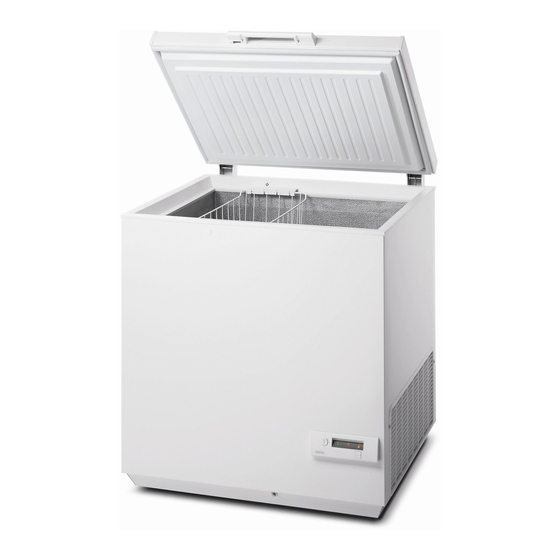Zanussi ZFC 215 B Operating And Installation Manual - Page 3
Browse online or download pdf Operating And Installation Manual for Freezer Zanussi ZFC 215 B. Zanussi ZFC 215 B 4 pages. Chest freezer zfc 215 b; zfc 265 b; zfc 405 b

THE ROLE OF THE PRESSURE EQUALISATION VALVE
The pressure equalisation valve installed in your freezer automatically eliminates the pressure difference
which otherwise would make it very difficult or even impossible to open the lid. It may be possible to
hear the operation of the valve as the air flows in through the airing outlet in the rear wall of the cabi-
net. For a safe operation, keep the two openings of the valve clear, do not cover them!
CONTROL PANEL
The green light is illuminated as long as the freezer is connected. The yellow light is illuminat-
ed when the "Super" button is depressed. See under "Freezing". The red light is illuminated
when the temperature in the freezer is higher than the thermostat setting (alarm).
The red alarm light can be due to: Insertion of a large amount of fresh food. The red alarm light
will go out after a while. Opening the lid too long. The red alarm light will go out after a while.
A defect in the system. See under "If something does not work".
CAPACITY
The freezing capacity of the freezer is stated in the data plate (kg/24 hours). Do not exceed
the amount stated - if you do, the freezing time will be extended. The data plate is located inside
the lid.
IMPORTANT The freezing capacity stated can be utilised to the full occasionally to
freeze large amounts of fresh food. However, if the freezer is filled with large amounts
of food for freezing every day, the capacity stated is reduced by about one-third.
BASKET
The baskets are designed for the storage of food which has already been frozen. The handles
can be placed in two positions, as shown in the drawings.The baskets can either be placed
inside the freezer or hung on the edge of the casing.
DEFROSTING
The formation of frost on the inside of freezers cannot be avoided. Frost is formed when mois-
ture contained in the air comes into contact with the cold surfaces of the freezer. Consequently,
the lid should only be opened when necessary, and it should never be left open. A thin layer of
ice or frost does not affect the function of the freezer adversely, and can be removed carefully
using the scraper provided.
IMPORTANT Never use a knife or any other sharp implement to remove frost.
When the frost or ice layer is 10-15 mm thick, the freezer should be defrosted. We suggest that
you defrost your freezer when there is little or no food inside. Switch off the current. Remove
the contents of the freezer, wrap them in newspapers, and leave them in a cold place. The
speed of defrosting can be increased by placing one or more bowls of hot (not boiling) water
inside the freezer and closing the lid. Open the lid after a while, and remove the layer of ice
carefully. The defrost water can be collected in a bowl as shown in the drawing. Do not try to speed up defrosting by using anything
other than hot water, since this may damage the freezer. After defrosting, clean the inside of the freezer.
IMPORTANT Remember to replace the plug in the drip water drain.
HOW TO CLEAN YOUR FREEZER INSIDE
Remove the plug from the mains socket, and remove all loose accessories before cleaning the freezer. The best time to clean your
freezer is after defrosting and before the electricity supply is connected again. Use a damp cloth to clean your freezer. Use hot water,
and a mild, non-aromatic cleaning agent. After cleaning the freezer, clean the basket/baskets before replacing them.
IMPORTANT Never use strong cleaning agents, scouring powder or strongly aromatic cleaning agents to clean your freez-
er inside, since this will damage the inside and leave a strong smell.
WHEN NOT IN USE
Disconnect the appliance from the electricity supply. Remove all goods from the freezer. Clean the freezer as described above.
Leave the lid slightly open.
Green light
Thermostat
Red light
button
Yellow light
„SUPER"
F F R R E E E E Z Z I I N N G G
C C A A P P A A C C I I T T Y Y
